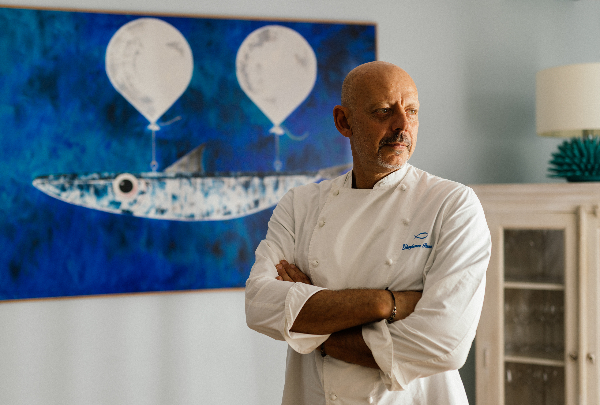Interview
Gianfranco Pascucci: "I'm afraid that one day the wild fish will be gone. That's what drives me to fight to prevent it".

Pascucci's culinary universe can be defined in two words: sea cuisine. A simplicity that is not so simple because it includes the sea, the land and social commitment.
For those of us who do not come from the land of the boot, Fiumicino probably only sounds like the big airport where we disembark to see Rome and its wonders. But Fiumicino is also - and above all - a small fishing village on the Tyrrhenian coast, rich in seafood restaurants and love of the sea.
Hugging the Tiber Delta, its sandy, low-lying coastline is home to one of the Italian chefs who best embodies the adjective maritime: Gianfranco Pascucci. A chef who tirelessly repeats that his cuisine "is not just fish cuisine, but sea cuisine, because the sea has the power to influence the land around it. Its culture, its fruits, its vegetables are influenced by it. The sea is not just salt water, it is also the land that accompanies it," he explains. It is a belief that he is well aware of at Pascucci al Porticciolo, the restaurant he runs with his wife Vanessa in this coastal town in Lazio. "The taste of the sea begins in the bushes, in the salty soil, in the laurel, in the rosemary... Often my dishes are the result of a walk along the coast", confesses the self-taught chef, who likes to recall the afternoons he spent with his grandfather collecting coquina clams on the beach for the restaurant he had in the same place that Gianfranco would later reclaim for his own culinary adventure.
And since those coquina clams and his first spaghetti at the age of twelve - "I've always had this passion for cooking and even as a child I used to prepare breakfast for the whole family and then lunch, always remembering everyone's taste" - Pascucci has made a name for himself in Italian cuisine, where he is recognised not only for his passion for fish but also for his commitment to the sea, which is his main supplier. Gianfranco is aware of the need to "protect the sea at all costs, because not only do we love it, but we also benefit from it, and in order for this to continue, we must protect it". With this in mind, the chef has created an association called Periferia Iodata, in which "we are 14 restaurateurs from Fiumicino who are aware of the problem, who are committed to using sustainable ingredients and who are fighting against plastic in the sea", he tells us.
In a world that is threatened by so many environmental challenges and in which every territory is struggling to preserve its identity, Gianfranco Pasucci is an example of why the social dimension of the chef is becoming increasingly important. Beyond the pots and pans, the chef is taking a stand and protecting his environment, contributing his grain of sand to this global struggle, something Pasucci is happy to do because he believes that "as chefs, our greatest contribution to this cause is to spread the word, a commitment we must make on a daily basis". Proof of this is his appointment as WWF ambassador for the protection of the Macchiagrande Oasis, 280 hectares of maritime pine, honeysuckle, heather and mastic trees that make up part of this land with a taste of the sea that Gianfranco praises in his dishes. In collaboration with the WWF, for example, Pascucci is working to promote species of fish that have been mistreated, such as the red mullet from Lake Burano, which has "great taste at a low price".
Pascucci suggests opening up to non-traditional species as a way of enhancing the value of the territory and diversifying the fishery, but not to close oneself off. "There is no fish I don't like to cook. What I don't want to cook is a fish that is inflationary, that has been fished in an environmentally unfriendly way, or whose main characteristics I cannot recognise. I'm not interested in that fish," he says.
The serious impact of human activity on the sea, whether in the form of overfishing or pollution, threatens a way of understanding the relationship between the sea and cuisine that worries the chef. What will happen when the wild fish are gone, we ask him. "I live with this fear, but I don't want to think about it. I prefer to think about what I can do to prevent it from happening, what the solutions are, which I think include more conscious and better quality fish farming. We have to protect this great resource that the sea offers us," says Pascucci in his speech.
Deep down, the fears, hopes and loves that Gianfranco projects onto his sea, the Tyrrhenian, are shared by all chefs who make the waters of the Mediterranean, the Atlantic or the Indian Ocean their larder. The sea is one, which is why Pascucci says he can imagine himself cooking in any sea, although he qualifies that "it would be a stimulus to return later to my own sea and put everything I have learned into it" because, as he understands cooking, "a dish tells us about an identity, that of the chef, but also that of a territory". This completes the circle that Pascucci himself outlined at the beginning of this interview: the territory is a whole, which is why Pascucci, in addition to the products of the sea, includes in this equation what the surrounding land offers him: the herbs, fruits and vegetables that his grandmother used to grow. And above all, as the chef himself says, "what drives us is passion, passion for the ingredients, the curiosity to understand them, to know them well and to protect them".











